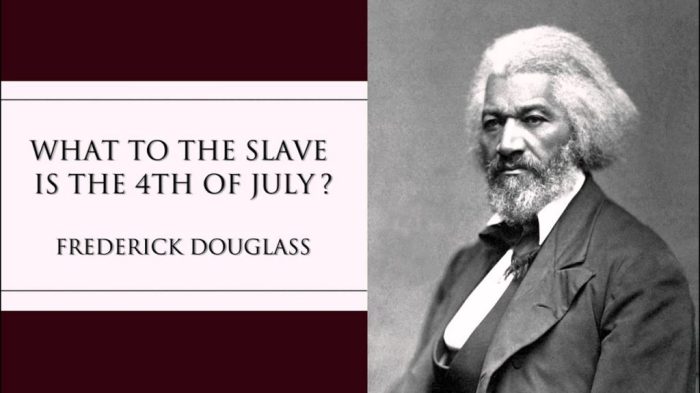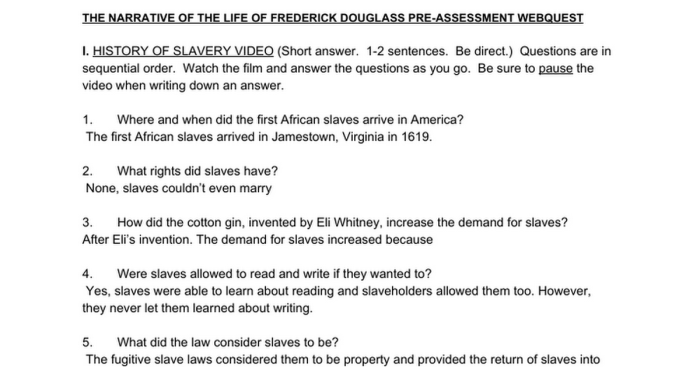Analyzing text frederick douglass answer key – Delving into the profound writings of Frederick Douglass, this comprehensive guide provides an analytical framework for understanding his powerful words. As we embark on this journey, we will uncover the intricate tapestry of his writing style, explore his searing indictment of slavery, and illuminate his unwavering vision for a just society.
Through meticulous examination of Douglass’s language, rhetorical devices, and personal experiences, we will gain invaluable insights into the mind of a visionary who shaped the course of American history. His writings, a testament to his indomitable spirit and unwavering commitment to equality, continue to resonate with contemporary audiences, inspiring us to confront the challenges of our time.
Frederick Douglass’s Writing Style: Analyzing Text Frederick Douglass Answer Key
Frederick Douglass, a prominent abolitionist and author, possessed a distinctive writing style that effectively conveyed his experiences, beliefs, and arguments. His prose was characterized by vivid imagery, powerful language, and a deep understanding of rhetoric.
Douglass’s use of language was both eloquent and accessible. He employed literary devices such as metaphors, similes, and analogies to create vivid imagery that resonated with readers. For example, in his autobiography, he describes slavery as “a dark, cold, and desolate night.”
This powerful metaphor conveys the oppressive and dehumanizing nature of the institution.
Rhetorical devices also played a crucial role in Douglass’s writing. He skillfully employed repetition, antithesis, and parallelism to emphasize his points and create a sense of urgency. In his speech “What to the Slave Is the Fourth of July?,” he asks, “What have I, or those I represent, to do with your national independence?” This rhetorical question effectively highlights the hypocrisy of celebrating freedom while enslaving others.
Douglass’s writing style reflects his experiences as a slave and his unwavering commitment to abolition. His vivid descriptions of the horrors of slavery convey the depth of his suffering and the urgency of his cause. His skillful use of language and rhetoric allowed him to effectively communicate his message and inspire others to join the fight for justice.
Douglass’s Analysis of Slavery

Frederick Douglass’s experiences as a slave profoundly shaped his views on slavery and its evils. He witnessed firsthand the brutality and dehumanization inherent in the institution, and his writings provide a powerful indictment of its horrors.
Douglass argued that slavery was not only a moral abomination but also a crime against humanity. He denounced the institution’s use of violence, degradation, and separation of families. In his autobiography, he recounts the cruel beatings he endured and the constant threat of being sold away from his loved ones.
To support his arguments, Douglass drew upon both personal anecdotes and historical evidence. He shared his own experiences as a slave to illustrate the horrors of the institution. He also cited historical documents, such as the Declaration of Independence, to expose the hypocrisy of a nation that claimed to value freedom while enslaving millions.
Douglass’s writings had a profound impact on the abolitionist movement. His powerful denunciations of slavery helped to mobilize public opinion and galvanize support for the cause. His autobiography, in particular, became a key text for abolitionists, providing a firsthand account of the horrors of slavery and inspiring others to join the fight for justice.
Douglass’s Vision for a Just Society

Frederick Douglass’s vision for a just and equitable society was rooted in his experiences as a slave and his unwavering belief in the equality of all people. He advocated for a society where all citizens, regardless of race or gender, enjoyed equal rights and opportunities.
Douglass believed that education was essential for the advancement of African Americans. He established schools and colleges for freed slaves and advocated for the integration of public schools. He argued that education would empower African Americans to participate fully in society and challenge the racist stereotypes that had been used to justify slavery.
Douglass also fought for the equality of women. He supported women’s suffrage and the right to education. He believed that women should have the same opportunities as men to contribute to society and to achieve their full potential.
Douglass’s vision for a just society extended beyond the abolition of slavery. He called for the creation of a society where all citizens could live with dignity and respect, regardless of their race, gender, or background.
Douglass’s Legacy and Impact

Frederick Douglass’s legacy as a writer, orator, and activist is immense. His writings and speeches continue to inspire and challenge readers today. His autobiography remains a powerful testament to the horrors of slavery and the indomitable spirit of those who fought for freedom.
Douglass’s influence on American literature and history is undeniable. His writings helped to shape the abolitionist movement and contributed to the development of civil rights movements. His ideas on equality, justice, and education continue to resonate with contemporary audiences.
Douglass’s legacy is one of hope and inspiration. He overcame adversity and used his voice to fight for a better world. His writings remind us of the power of the human spirit and the importance of fighting for justice and equality for all.
FAQ Summary
What is the significance of Frederick Douglass’s writing style?
Douglass’s writing style is characterized by its vivid imagery, powerful rhetoric, and skillful use of personal anecdotes. He employs a range of literary devices, including metaphors, similes, and allusions, to convey his experiences and beliefs with clarity and emotional impact.
How did Douglass’s experiences with slavery shape his views on society?
Douglass’s firsthand experiences with the brutality and dehumanization of slavery fueled his passionate advocacy for abolition and his unwavering belief in the inherent dignity of all human beings. His writings expose the horrors of the institution and challenge the prevailing racist ideologies of his time.
What was Douglass’s vision for a just society?
Douglass envisioned a society free from racial prejudice and discrimination, where all individuals have equal opportunities to education, employment, and political participation. He believed that education was the key to empowering African Americans and that the abolition of slavery was only the first step towards achieving true equality.